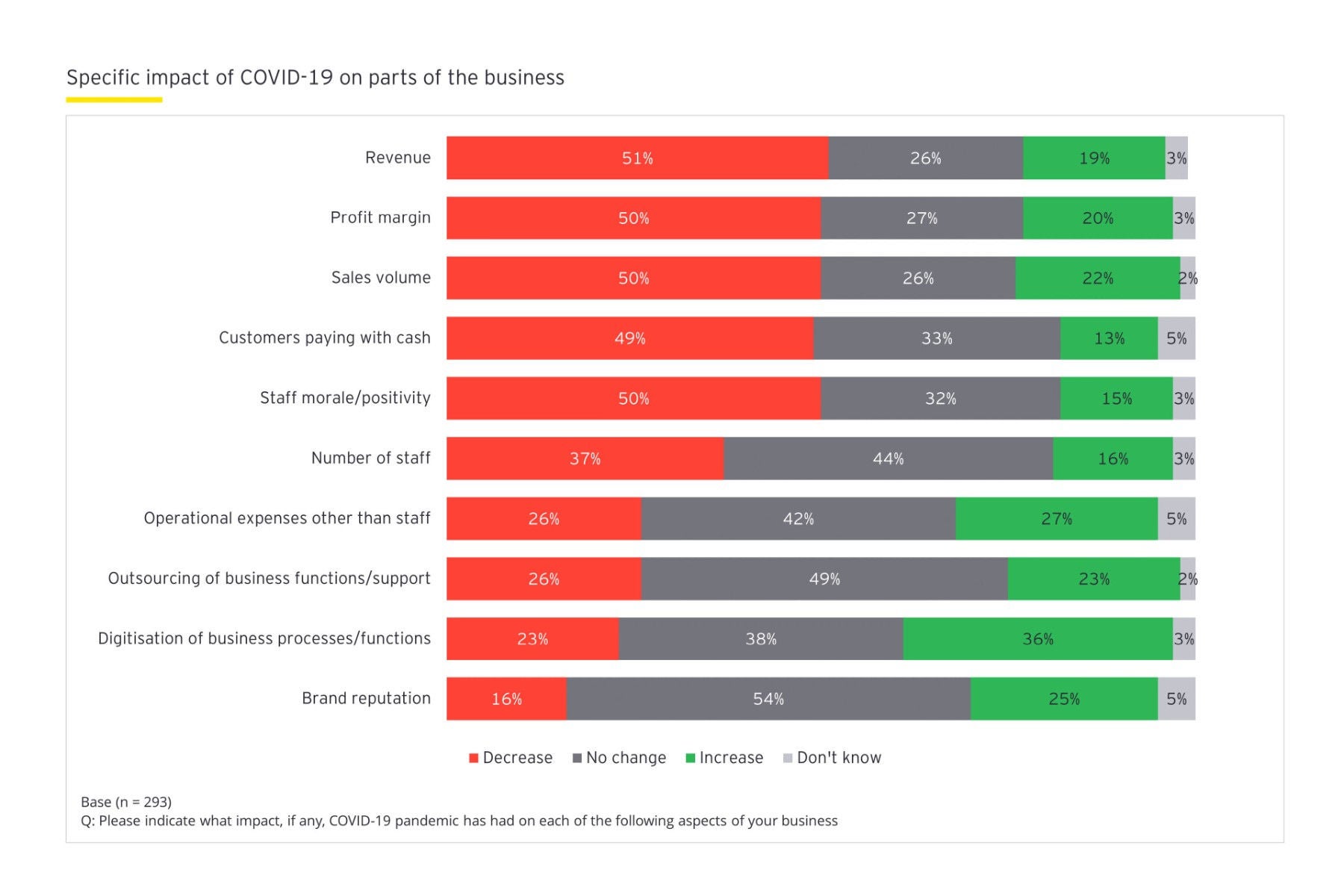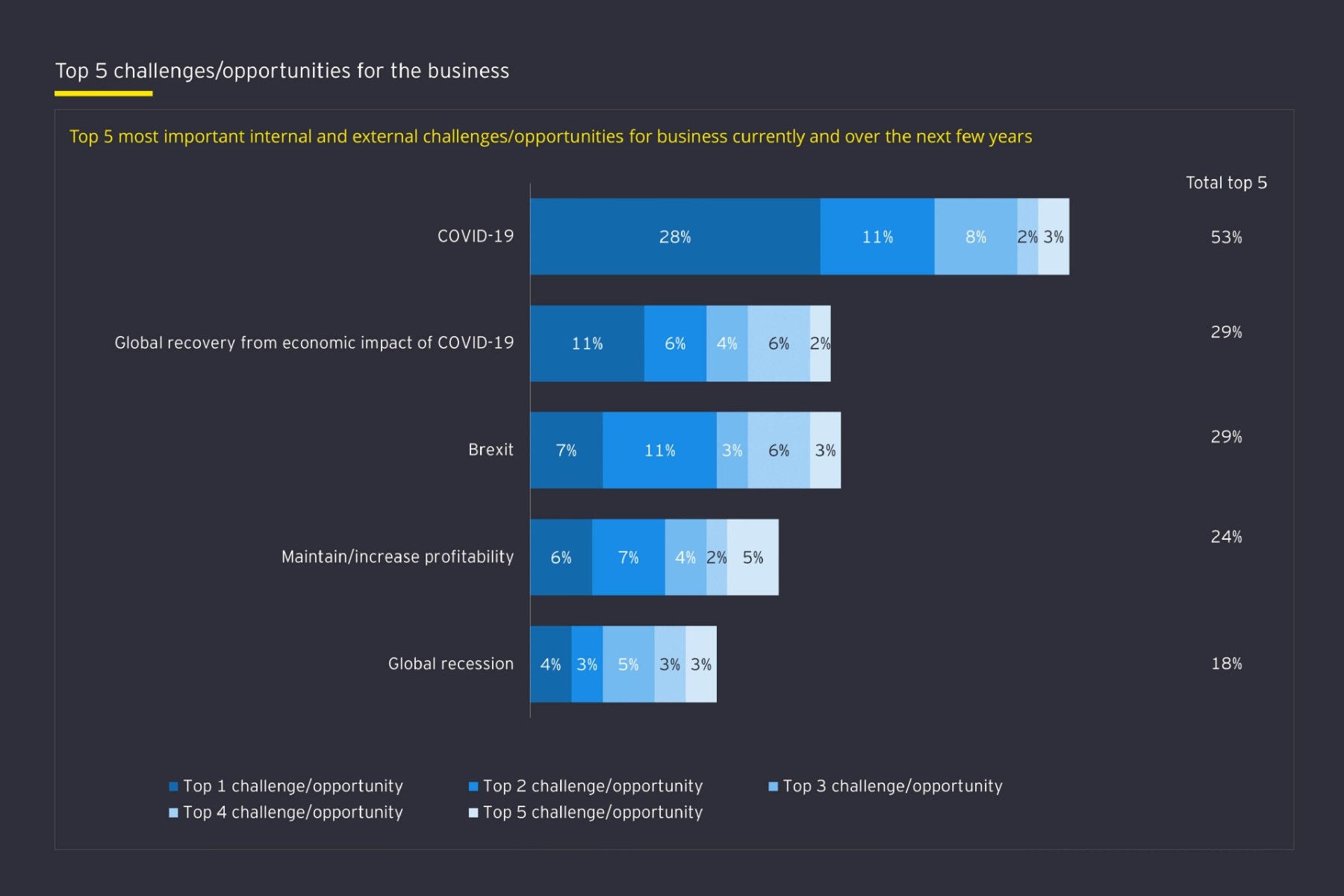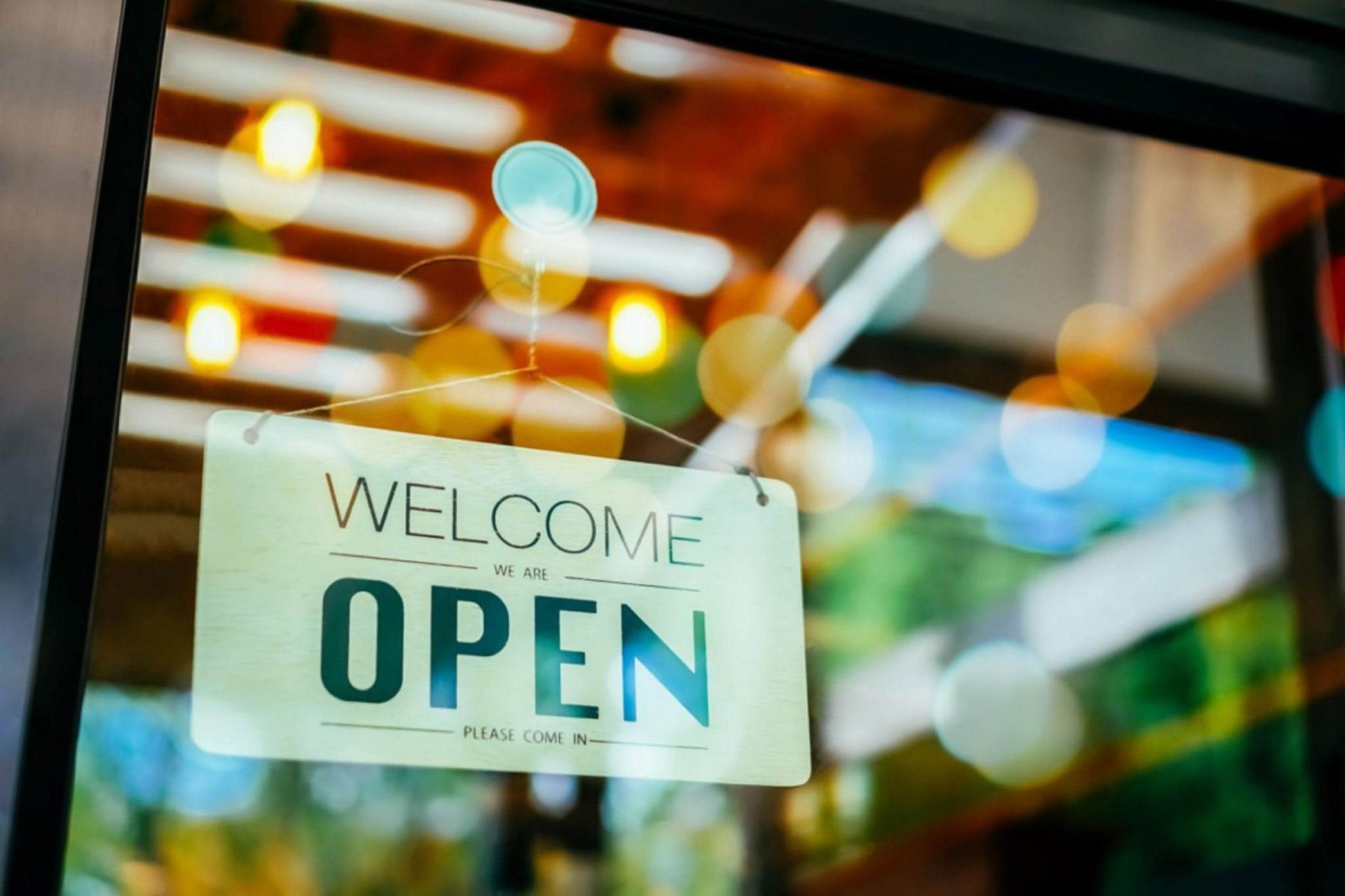EY refers to the global organization, and may refer to one or more, of the member firms of Ernst & Young Global Limited, each of which is a separate legal entity. Ernst & Young Global Limited, a UK company limited by guarantee, does not provide services to clients.

SMEs in Ireland are bouncing back. Find out how they are reimagining supply chains and pivoting towards value-led sustainable business models.
In brief
- Businesses that invested in digital capabilities, both from operating and sales perspectives, have found the necessary changes in operating models more achievable.
- According to the EY survey, 47% of Irish respondents said there was no change in their profit margins or there was an increase despite the pandemic.
- Many Irish private businesses are seeing the growth opportunity from providing sustainability solutions in areas such as packaging, energy consumption, and many more.
Notwithstanding the ongoing efforts to control and live with COVID-19, the second half of 2021 has seen many small and medium-sized enterprises (SMEs) on the island of Ireland enter the recovery phase after more than a year and half of enduring the pandemic. While SMEs generally are bouncing back with resilience, the varied nature of the sector in both industry type and lifecycle stage means that the impact of the pandemic has been felt unevenly. While some businesses endured the pandemic better than others, many businesses are still impacted by restrictions and changes in consumer behaviour.
The new “variant of concern” emerging in news headlines at the time of writing may be a reminder that the pandemic is far from over, but there is still no real-world data to establish the magnitude of threat and it is seen to be mild so far. Businesses remain cautiously optimistic as there is a sense that the impact may be less severe than in 2020 as the world is better equipped with vaccine rollouts and consumers have adapted to new ways of living and working.

Chapter 1
Disproportionate impact of the pandemic
A key indicator of long-term value is fostering transformation readiness into the DNA of leadership teams.
A recent global EY survey¹ found that although 82% of Irish SMEs were negatively impacted by the pandemic, the disruption also amplified opportunities for an acceleration in online/digital initiatives and a pivot toward the development of more sustainable business models. This is crucial for the overall recovery of Ireland in the post-pandemic era, given the significance of the sector in Ireland, accounting for 99% of active businesses and employing around 68% of the private sector workforce².
The survey indicated that while all SMEs in Ireland have been impacted, 13% of them experienced a positive impact. And 21% have seen only a slightly negative impact on their businesses and were able to sustain the pressure and the uncertainty.

The financial fragility of many small and medium-sized enterprises was exposed during the lockdowns and closures. Irish SMEs reported revenue and profit margins as the areas hardest hit. However, 45% of them said there was no change in their revenue despite the pandemic or there was an increase in the top line. According to the EY survey, 47% said there was no change in their profit margins or there was an increase. These data serve to highlight the deeply industry specific impact of COVID-19 with the long-term impact on certain industries still to be determined. The uncertainty and economic fallout of the pandemic notwithstanding, 79% of the Irish SMEs said that their brand reputation either remained intact or got better.

“One of the clear features of the pandemic was just how sectoral the impact was once we could steer past the initial months. The tourism and hospitality sectors remain significantly impacted and are a core part of our economy, particularly outside Dublin. Looking a layer deeper, businesses that had invested in their digital capabilities, both from operating and sales perspectives, found the necessary changes in business and operating models more achievable. Building transformation readiness into the DNA of leadership teams has emerged as a critical indicator of long-term value,” said Roger Wallace, EY Ireland Assurance Partner and Head of Entrepreneur of the Year Programme and PMM | EY Private.
The pace of digitisation initiatives accelerated through the pandemic. As SMEs reimagined their business processes to soften the blow of COVID-19, traditional in-person models gave way to faster adoption of digital tools, cloud computing, and online businesses. The EY survey showed that more than a third (36%) of the Irish SMEs said that there was a pick-up in digitisation of their business/process/functions and one in 10 (11%) planning to move to an e-commerce or online-only model, thereby taking the sustainability of their operations a step forward.
Leaning on talent and transformation
The pandemic’s impact on workers and wages has been unprecedented and well documented globally. The effects on business continuity and the labour force are still a matter of concern. However, interestingly, the survey found that 60% of respondents said there was either no change in their staff numbers or that it had increased.
In another EY survey³ conducted earlier this year, almost nine out of 10 entrepreneurs (88%) said they intended to increase their headcount in 2022, thereby highlighting that the outlook for entrepreneurship on the island of Ireland remains optimistic despite the twin headwinds of COVID-19 and Brexit. Many entrepreneurs are now focused on a range of strategies to deliver success, including plans to expand into global markets and create new business models.
For many private businesses looking to scale their operations, access to the right talent can be a potential game changer. The success of the Irish economy in creating high skilled jobs in areas such as technology, life sciences and finance has created a demand-supply imbalance.
Roger Wallace
EY Ireland Assurance Partner and Head of Entrepreneur of the Year Programme and PMM | EY Private
“At the same time, our services sectors are indicating that they are struggling to attract people back into employment post the pandemic. While there are multiple drivers for both, SMEs of all types need to put talent attraction and retention at the heart of their strategy. Somewhat like digital capability, it is arguable that whether or not they invest in this area is not really a choice for most businesses,” he added.
Many SMEs are choosing to meet post-pandemic challenges with business model transformation programmes. While this is very encouraging on one level, businesses must ensure that they continue to grow sustainably during the transformation. It is critically important that organisations set out their sustainable growth strategies first before aligning them with transformation strategies.
With the gradual opening of the economy, the Irish Government rolled out a suite of schemes that included the Economic Recovery Plan⁴ to support the resumption of a sustainable, innovative path of growth. The EY survey found that Government support and bank finance provided a desperately needed lifeline to the SMEs over the past 18 months with 57% saying they received State funding to assist them during the pandemic. The survey also found that 47% accessed funding through bank loans and business grants as well as personal assets and finances. An earlier EY survey found that 62% respondents described Government as supportive or very supportive of entrepreneurship, representing an increase on previous such statistics.

Chapter 2
Adapting business models to the next normal
The necessity to change has helped many businesses realise long-held digital ambitions.
The challenge for Irish SMEs now is to mount an adequate response to current challenges by effecting deep and potentially long-lasting business transformation. As a result, many are pivoting their operations, realigning their business strategies to the post-pandemic era, and moving towards more sustainable business models.
“Permanent changes in consumer preferences cannot yet be concluded upon comprehensively. However, it is clear that health and wellbeing as well as environmental sustainability have increased in consumer consciousness. And SMEs who are conscious of how their businesses can make a difference in areas such as these are more likely to develop strengths rather than succumb to disruptions,” added Roger Wallace.
The EY survey found that more than half of Irish SMEs (54%) are planning to change and adjust their business models in response to changing market conditions.
While some businesses are under pressure or are slowing down, there are others that are accelerating. In Ireland, 30% of SMEs are in growth/rapid growth phase even after the pandemic, with factors such as new service/product development and enhancement in their digital presence contributing to their growth. These tend to be established businesses with year-on-year sales increases, where costs may be reducing with some profitability realised, as defined by the EY survey.
Those in the maturity/stabilise phase5 are also seen to be reaping the benefits of implementation of new IT/technology/software and an increase in their digital presence as well as new service/product development.
“The pandemic uncovered levels of digital exposure that many didn’t realise. Organisations with sophisticated digital platforms and systems were able to change quickly with less disruption – both in terms of flipping to remote working with no notice, but also in how they served their customers and their ability to continue to generate revenue. Sophisticated technology, data and systems are what helps businesses to separate from the pack,” said Helena O’Dwyer, Head of Strategy, EY-Parthenon.
Today’s high-growth businesses are firmly focused on digital customer experience, CRM, supply chain optimisation, projects that rely heavily on AI and robotic process automation - all of which bring more agility and underpin business models that will sustain growth.
Helena O’Dwyer
EY Ireland Partner; Head of Strategy EY Parthenon
A significant number of SMEs are pivoting to online operations. Given the mass shift of traditional retailing to an online only or click-and-collect model during the pandemic, that change is not unexpected. According to a recent report by the European Commission, the number of Irish businesses selling online is significantly above the EU average as Ireland’s digital competitiveness among EU member states improved significantly in the past 12 months6.
Furthermore, the shift to remote working in many sectors and the adoption of hybrid workplace models in the wake of the pandemic makes business model change not only natural, but necessary in many cases.
“For a number of years now we have seen SMEs compete in fashion, health and beauty, consumer products, food and beverage and other such markets which they had long been locked out of due to high entry costs and highly competitive established brands. In recent years, innovative, original products with well-crafted brands and a clear understanding of customers have used digital tools to establish their market presence and this has been further propelled by the pandemic,” Roger Wallace observed.
Authenticity of brand and product, deep understanding of target markets and skilled and persistent digital engagement with those customers are critical to unlocking online growth and Irish entrepreneurs and SMEs are well capable of doing so on a global scale.
Roger Wallace
EY Ireland Assurance Partner and Head of Entrepreneur of the Year Programme and PMM | EY Private
These changes may have been forced on businesses by the most unusual of circumstances, but that compulsion has also brought benefits. There may be differences in the types of tools adopted across sectors, but the necessity to change has helped many businesses realise long-held digital ambitions and to break down barriers. It has also helped SMEs overcome their reticence when it comes to adopting new technologies.
Digital transformation can provoke mixed emotions in SMEs. It can be daunting and a little frightening, but it also can be very inspiring and exciting. The transition will be complete when they understand the potential of the new tools and technology, select the right digital systems, put in place the right security to manage and mitigate risks, and upgrade digital skills within the organisation.
“While the pandemic was a hugely traumatic disruptive event for the vast majority of businesses, it also forced many organisations to pivot almost overnight to be in a position to continue operating. It prompted others to entirely reimagine their strategies and business models. We’ve spoken to many traditional bricks-and-mortar businesses, untethered for the first time from their physical locations, who have since expanded into new markets and are forecasting significant growth in the years ahead,” said Helena O’Dwyer.
The EY survey found that just 25% of Irish SMEs regard themselves as both financially and digitally mature. But many of them see the merits of using more sophisticated systems and nearly half of them (48%) say that having a fully integrated platform from which to access all of the services they need to run their businesses would support them better at their current stage of development.
“While undoubtedly many organisations more than felt the pandemic pinch, we can see a big cohort of organisations that have actually thrived over the last year and are growing and expanding. We are working with increasing numbers of small and medium-sized organisations actively investing in their growth strategies and looking to break into new markets, including the US and Asia,” said Helena O’Dwyer.
Cybersecurity came in for particular attention. Almost a third (31%) of Irish SMEs cited it as a major challenge. Among the key areas of concern were the need to raise awareness of the risks among employees and protecting the business against ransomware and other cyberattacks and threats.
Cybersecurity is tasked with managing risk that goes into a broader ecosystem, much beyond the organisation. To be truly confident in their ability to manage cyber risk and to ensure business continuity, organisations need to consistently test their abilities to counter and respond to danger. And that requires regular crisis response exercises, growing use of methods such as penetration testing, and critical evaluation of forensic security and other capabilities7.

Chapter 3
Reimagining supply chains
The pandemic has opened opportunities for SMEs to build sustainable supply chains to improve speed to market.
Some sectors were far more seriously impacted by the COVID-19 pandemic than others, most notably those that faced the longest and most severe lockdowns. The tourism, entertainment, arts, and recreation services sector, for example, has been an obvious casualty of various lockdowns and restrictions. It is no surprise, therefore, that COVID-19 is ranked the number one among the challenges and opportunities for those businesses now and over the next few years.

When the top five issues keeping businesspeople awake at night across all sectors are analysed, the results demonstrate the deep impact of the pandemic. COVID-19 tops the list for all sectors with Brexit almost paling in comparison.
The pandemic practically upended the supply chains of small and medium-sized enterprises, rupturing logistics for both the upstream and downstream parts of the business. The EY survey found that 76% of the Irish SMEs had their supply chain impacted. Although 24% said there was little or no impact, more than a third (36%) said they had trouble sending goods/services.
This, of course, opened up opportunities for SMEs to reinvent their supply chains, building in more resilience and to improve speed to market. However, the real test will be in defining the path forward so that supply chains are also more sustainable.
Historically, supply chains have been optimised to the lowest price, but the new goal will be net zero emissions. With organisations being forced to take responsibility for their Scope 3 emissions (which include all indirect emissions other than those associated with purchased energy), this will then lead to organisations re-examining their complete supply chain to select partners with the lowest emissions as well as the best price, quality, and other metrics.
That will, in turn, require much greater visibility across entire supply and value chains. For Irish SMEs that means developing digital-led supply chains which will deliver real-time data and information not only on where in the world key supplies are at any given moment but also on the status of the supplier in terms of emissions outputs as well as the social and governance aspects of their business.
They should also move to become more circular enterprises. Businesses that have embraced circularity are benefitting through cost reductions, energy savings, improved valuations, and favourable consumer and investor attitudes toward their brands.
The main difference between circular and traditional sustainability efforts is that instead of trying to reduce a negative footprint, organisations are attempting to create a positive one.

Chapter 4
Embracing a sustainable path to growth
There is a great opportunity now for Irish SMEs to embrace value-led sustainability.
With great change comes great opportunity and many SMEs are recognising the value of running a more sustainable business where their profitability can coexist with care for the environment and social commitment.
“Irish entrepreneurs have a high level of awareness of the importance of the sustainability agenda for the long-term success and even viability of their businesses. However, the majority are still working out what an impactful sustainability strategy is for their organisation. At the same time increasing numbers of Irish private businesses are seeing the growth opportunity from providing sustainability solutions in areas such as energy consumption, packaging, agricultural technology and many more,” said Roger Wallace.
It is very encouraging to learn that the EY survey has found that 60% of Irish businesses say running a sustainable business8 is very or extremely important to them.
Breaking this down by industry sector, 72% of hospitality, tourism, entertainment, arts, and recreation businesses said running a sustainable business is very or extremely important.
I believe there is an increased role for our state agencies and the advisor community to build capability in sustainability support for SMEs – running private businesses can be challenging enough without becoming sustainability specialists at the same time.
Roger Wallace
EY Ireland Assurance Partner and Head of Entrepreneur of the Year Programme and PMM | EY Private
As noted in the EY State of Sustainability 2021 report, value-led sustainability and profit are not mutually exclusive and Irish organisations are now faced with a world of opportunity. The research underpinning the EY State of Sustainability report found a relatively high level of awareness and understanding of sustainability within Irish organisations. More than 60% of respondents to the survey said there was good or complete awareness of sustainability considerations and implications across their organisations.
These high levels of awareness point to a clear opportunity for Irish private businesses to embrace value-led sustainability (VLS), which turns ESG into a business as well as a moral imperative.
“As Irish SMEs take their business process development to scale in the post-pandemic environment, they are gravitating more toward value-led growth that focuses as much on societal and environmental impact as on human aspects of strategies,” said Helena O’Dwyer.
If the commitment to sustainability translates into the adoption of independent benchmarks to measure sustainability performance, Irish businesses can make real strides quite quickly in this critically important area.
Generally, the Irish economy is coming through the COVID-19 period well. Entrepreneurs and private business owners are leaders in business, in our economy and in our communities. Supporting these people and their businesses is a core element of our purpose in EY as it is this group who will drive our country forward to the next generation.
Roger Wallace
EY Ireland Assurance Partner and Head of Entrepreneur of the Year Programme and PMM | EY Private
About the survey
The survey engaged with 5,698 global SMEs to listen to their experiences. There were a series of one-on-one, in-depth interviews with SMEs across 16 markets, 310 of which were in Ireland. The study involved both qualitative and quantitative research across three stages: Interactive client immersions; in-depth interviews with SMEs; and qualitative surveys with SMEs. Of the 310 Irish respondents, 44% said their business premises were located in metropolitan/urban areas, 34% said suburban areas and 31% said their business premises were in regional/rural areas. A fourth (25%) of the Irish respondents were from the professional, financial, scientific and technology services industry, while 22% were from the retail, wholesale, transportation, warehouse; another 10% were from hospitality, tourism, entertainment, arts, recreation services.
For the purpose of the study, an SME was defined as a business with between 10 and 249 full-time equivalent employees.
How EY can help
Our 7 Drivers of Growth framework can help your business successfully execute your growth strategy over the long term. Find out how.
Read moreService Leader
-
 Frank O’Keeffe
Frank O’KeeffeEY Ireland Managing Partner
Summary
The intention to transform digitally and embrace new sustainable business models on the part of Irish SMEs point to a clear pathway to recovery in the post-COVID-19 world. There will be challenges, of course, and businesses will need assistance to overcome them.
First, they must address their own digital maturity and overcome their reticence when it comes to the adoption of new technologies. That will enable them to adopt digital-first business models which will help them rebuild revenues and profitability. Those steps must be taken in tandem with a move to make positive ESG sentiment a tangible and measurable reality. Taken together, those actions will help create the sustainable businesses of tomorrow where profit and care for the environment are mutually supportive ends, where business growth and resource consumption are no longer a zero-sum game, and where the most successful businesses are the ones which create long-term value for all stakeholders.



